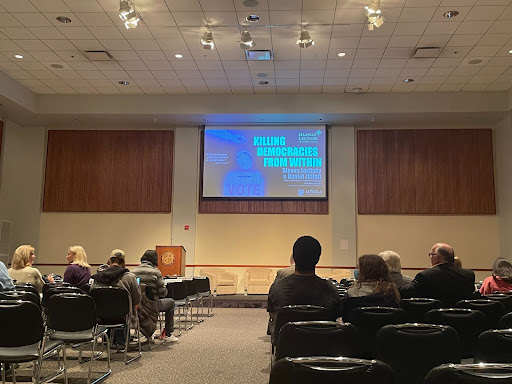On Oct. 27, Loyola University Maryland held its annual Hanway Lecture in Global Studies in McGuire Hall, giving students, faculty, staff, parents, and community members a chance to hear insights from Steven Levitsky and David Ziblatt. Political scientists at Harvard and award winners for their co-authored book “How Democracies Die”, Levitsky and Zilbatt engaged in a discussion about the factors contributing to the weakening of democracy both domestically and internationally.
The event was introduced by newly inaugurated President Terrence M. Sawyer, J.D. and moderated by two of Loyola’s own Global Studies majors, Bethlehem Eshetu ’24 and Juan Lopez ’24. Eshetu and Lopez were able to spend the evening guiding a conversation with Ziblatt and Levitsky as they broke down their book and the current state of democracies worldwide.
The lecture began with Levitsky and Ziblatt revealing what initially drew them to dedicate a book to investigating deteriorating democracies. As Levitsky put it, though he and Ziblatt study different regions of the world, they were mutually concerned after noticing the United States mimicking alarming patterns seen prior to detrimental events that have occurred in other countries.
One of Ziblatt and Levitsky’s main points from their book and the panel discussion is that democratic systems today deteriorate much differently than before; they are rarely destroyed by an outside party, but rather from within.
Levitsky said, “Democracies don’t die the way they used to. People our age… think of military coupes and an abrupt death to democracy… in the 21st-century that’s not how most democracies die. They die at the hands of elected presidents and prime ministers.”
While acknowledging the successes and downfalls seen with the implementation of democratic systems in the U.S. and elsewhere, Ziblatt noted that “we should be open to learning from other countries” where democratic improvements have been made.
Levitsky echoed this sentiment but cautioned against “adopting a one-size-fit[s]-all approach,” as many individualized, country-specific factors are at play in working democracies as well.
Speaking about the polarization of our democracy, Levitsky emphasized that not only do fundamental beliefs and political associations divide Americans, but so does geography. Viewpoints about how democracy should operate in rural versus urban areas, for example, tend to drastically differ.
Despite tension among citizens brought about by differing political opinions, Levitsky and Ziblatt encouraged conversation between those that are not like-minded to discuss issues, develop problem-solving skills, and gain perspective.
Staying relevant to today’s day and age, the writers took time to highlight the current role media plays. Levitsky talked about the different forms of media today, stating that markets dominated by private news sources lack in comparison to others.
He said, “When you have a larger public medium, like PBS or NPR… they become a market shaper… they raise the bar. When you have a market dominated by profit-seeking corporations… then the quality deteriorates and you don’t get that same kind of in-depth investigative reporting.”
Discussing how the media helps mold our current state of politics, Levitsky said, “Social media leads to polarization… I think the quality of media in our country is particularly low.”
Journalism student Bridget Botelho ‘24 shared that the comments on media today were some of her main takeaways.
Botelho said, “As a journalist, I think democracy is a very integral part of what we do…I thought it was really interesting, the takeaways they had, especially concerning the media and its role within democracy, making it better but at the same time providing a space for people to express some very hurtful things.”
Shifting focus to the fact that younger generations have always yielded low voting turnouts, Ziblatt referred to the common belief non-voters hold that their vote will not make a difference as “the ultimate case of the self-fulfilling prophecy” and “the most self-defeating logic” since voting is intended to represent one’s voice in a democracy.
Expressing concern, Levitsky said that “people who have grown up in the 21st century have not experienced a democratic success,” thereby discouraging them from voting.
Levitsky concluded with a full-circle message, connecting the central theme of “How Democracies Die” to the future of democratic systems.
“Just as democracies often die slowly and suddenly and gradually, they are saved slowly and suddenly and gradually too.”
A recording of this year’s Hanway Lecture in Global Studies is available here, and more information about the lecture series is available on Loyola’s website.
Featured Image Courtesy of Erin Altenbach













































































































